
This practice alert highlights the key take-aways from three recently adopted AAO decisions and some of the most important elements of the proposed regulations for advocates to challenge through comments, and contains an Appendix with case summaries of the AAO decisions.

On October 25, 2019, Attorney General Barr issued a precedential opinion limiting when immigration authorities will give effect to a state court modification of an imposed sentence. See Matter of Thomas and Matter of Thompson, 27 I&N Dec. 674 (AG 2019), available at: https://www.justice.gov/eoir/page/file/1213201/download (“Matter of Thomas/Thompson”) While advocates plan to challenge this decision in the courts of appeals, it is now binding law. This advisory summarizes the case, provides advice to defenders, post-conviction practitioners, and immigrant advocates about its implementation, and suggests arguments to raise on appeal.
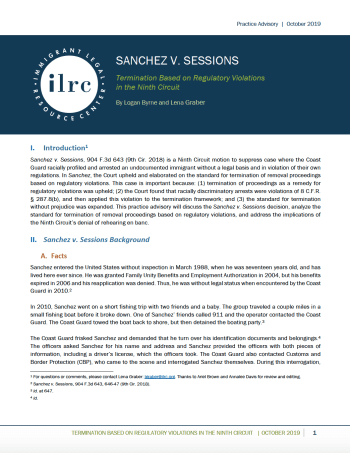
Sanchez v. Sessions was a landmark Ninth Circuit ruling on suppression of evidence and termination of removal proceedings. This advisory explains the decision, lays out the different legal standards for suppression and termination in immigration court, and highlights key holdings that practitioners can use to better defend their clients.
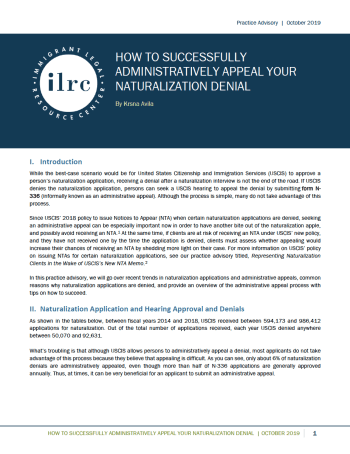
While the best-case scenario would be for United States Citizenship and Immigration Services (USCIS) to approve a person’s naturalization application, receiving a denial after a naturalization interview is not the end of the road. If USCIS denies the naturalization application, persons can seek a USCIS hearing to appeal the denial by submitting form N-336 (informally known as an administrative appeal). Although the process is simple, many do not take advantage of this process.
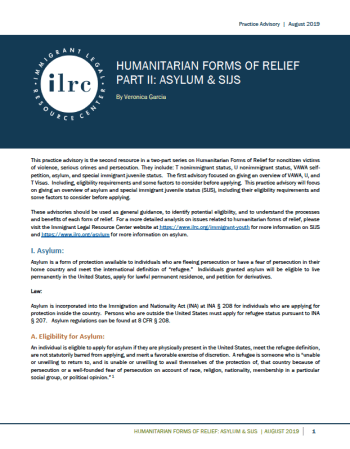
This practice advisory is the second resource in a two-part series on Humanitarian Forms of Relief for noncitizen victims of violence, serious crimes and persecution. They include: T nonimmigrant status, U nonimmigrant status, VAWA self-petition, asylum, and special immigrant juvenile status. The first advisory focused on giving an overview of VAWA, U, and T Visas. Including, eligibility requirements and some factors to consider before applying. This practice advisory will focus on giving an overview of asylum and special immigrant juvenile status (SIJS), including their eligibility requirements and some factors to consider before applying.
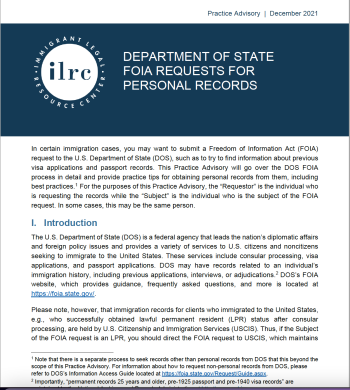
In certain immigration cases, you may want to submit a Freedom of Information Act (FOIA) request to the U.S. Department of State (DOS), such as to try to find information about previous visa applications and passport records. This Practice Advisory will go over the DOS FOIA process in detail and provide practice tips for obtaining personal records from them, including best practices.

In a flawed but significant decision, the Ninth Circuit held that California Penal Code § 243(d), battery with injury, is a crime of violence. United States v. Perez (9th Cir. July 11, 2019). Because of Perez, criminal defenders must assume that § 243(d) is a crime of violence and seek other dispositions when necessary. Immigration advocates should appeal adverse decisions and preserve the argument on appeal. See this Advisory for a discussion of the decision, alternative pleas, and suggestions for arguments.
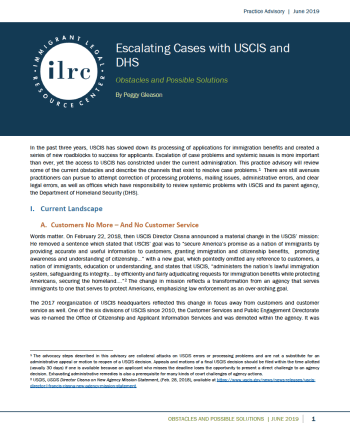
This practice advisory provides an overview of ways to advocate with USCIS and DHS components for solutions to individual case problems and systemic issues.

The Trafficking Victims Protection Reauthorization Act of 2008 confers initial jurisdiction over asylum claims filed by unaccompanied children (UCs) to the asylum office. The Board of Immigration Appeals’ decision in Matter of M-A-C-O-, as well as policy changes by the Trump administration have sought to strip away this crucial protection from many child asylum seekers. Because of these changes and legal challenges by immigrant youth advocates, the current landscape of initial UC asylum jurisdiction is in flux. This practice advisory provides an overview of the current state of UC asylum jurisdiction following the Matter of M-A-C-O- decision and issuance of the Lafferty Memo. It also discusses the ongoing JOP v. DHS litigation and gives some arguments and tips for practitioners to help them advocate for their UC clients to receive the statutory protections afforded by the TVPRA.
Noncitizen victims of violence, serious crimes, and persecution may be eligible for certain forms of immigration protection and status. These options are often referred to as Humanitarian Forms of Relief. They include: T nonimmigrant status, U nonimmigrant status, VAWA self-petition, asylum, and special immigrant juvenile status.